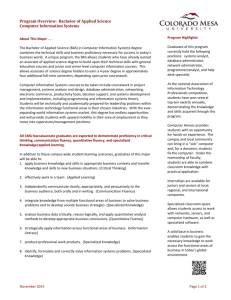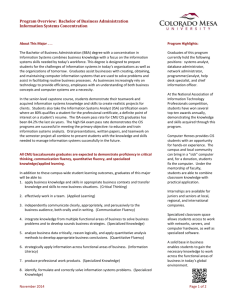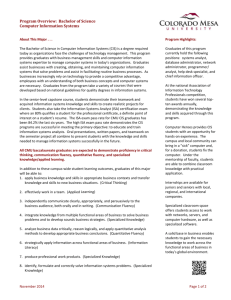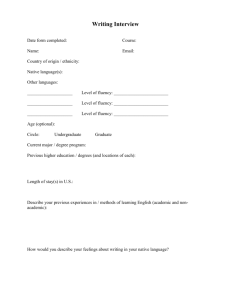Accounting - Colorado Mesa University
advertisement
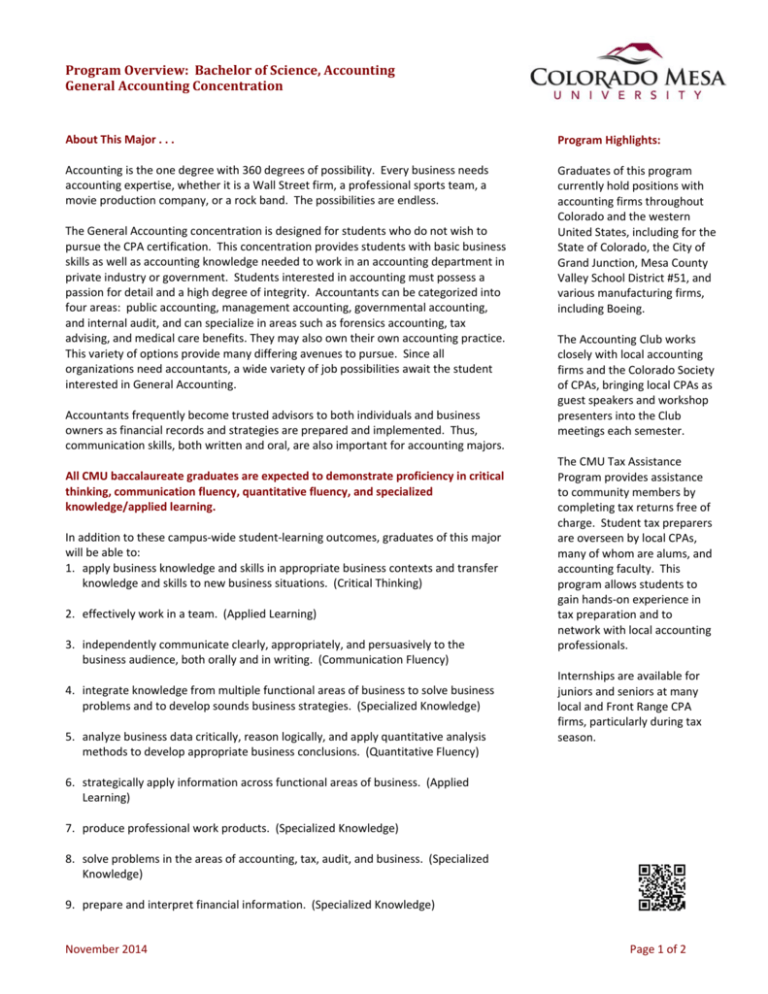
ProgramOverview:BachelorofScience,Accounting GeneralAccountingConcentration About This Major . . . Accounting is the one degree with 360 degrees of possibility. Every business needs accounting expertise, whether it is a Wall Street firm, a professional sports team, a movie production company, or a rock band. The possibilities are endless. The General Accounting concentration is designed for students who do not wish to pursue the CPA certification. This concentration provides students with basic business skills as well as accounting knowledge needed to work in an accounting department in private industry or government. Students interested in accounting must possess a passion for detail and a high degree of integrity. Accountants can be categorized into four areas: public accounting, management accounting, governmental accounting, and internal audit, and can specialize in areas such as forensics accounting, tax advising, and medical care benefits. They may also own their own accounting practice. This variety of options provide many differing avenues to pursue. Since all organizations need accountants, a wide variety of job possibilities await the student interested in General Accounting. Accountants frequently become trusted advisors to both individuals and business owners as financial records and strategies are prepared and implemented. Thus, communication skills, both written and oral, are also important for accounting majors. All CMU baccalaureate graduates are expected to demonstrate proficiency in critical thinking, communication fluency, quantitative fluency, and specialized knowledge/applied learning. In addition to these campus‐wide student‐learning outcomes, graduates of this major will be able to: 1. apply business knowledge and skills in appropriate business contexts and transfer knowledge and skills to new business situations. (Critical Thinking) 2. effectively work in a team. (Applied Learning) 3. independently communicate clearly, appropriately, and persuasively to the business audience, both orally and in writing. (Communication Fluency) 4. integrate knowledge from multiple functional areas of business to solve business problems and to develop sounds business strategies. (Specialized Knowledge) 5. analyze business data critically, reason logically, and apply quantitative analysis methods to develop appropriate business conclusions. (Quantitative Fluency) 6. strategically apply information across functional areas of business. (Applied Learning) 7. produce professional work products. (Specialized Knowledge) 8. solve problems in the areas of accounting, tax, audit, and business. (Specialized Knowledge) 9. prepare and interpret financial information. (Specialized Knowledge) November 2014 Program Highlights: Graduates of this program currently hold positions with accounting firms throughout Colorado and the western United States, including for the State of Colorado, the City of Grand Junction, Mesa County Valley School District #51, and various manufacturing firms, including Boeing. The Accounting Club works closely with local accounting firms and the Colorado Society of CPAs, bringing local CPAs as guest speakers and workshop presenters into the Club meetings each semester. The CMU Tax Assistance Program provides assistance to community members by completing tax returns free of charge. Student tax preparers are overseen by local CPAs, many of whom are alums, and accounting faculty. This program allows students to gain hands‐on experience in tax preparation and to network with local accounting professionals. Internships are available for juniors and seniors at many local and Front Range CPA firms, particularly during tax season. Page 1 of 2 Program Requirements A student must follow CMU graduation requirements by completing 120 semester credit hours, including 40 credits of coursework at the 300+ level. See the “Undergraduate Graduation Requirements” in the catalog for additional graduation information. Students should work closely with a faculty advisor when selecting and scheduling courses prior to registration. In general, CMU’s programs of study are based on two curriculum groups: 1. Essential Learning CMU’s Essential Learning program provides the foundation of skills and information that cuts across all fields of study and the support for advanced concepts that students will later encounter in their majors. Before moving into work at the 300+ level, students complete the Maverick Milestone and its co‐requirement, Essential Speech. This pair of courses is a capstone experience where students integrate what they have learned from their foundation courses by making connections among diverse areas of knowledge. The capstone is also an opportunity for students to work with disparate ideas, a critical skill expected of all CMU graduates that will aid them in solving the complex and unscripted problems they will encounter in their personal, professional, and civic lives. 2. What You Will Study in This Major. . . Foundational Courses These courses provide a solid basis for upper division accounting and business classes and focus in functional areas. Accounting Advanced Business Software Business Communications Fundamentals of Information Systems Business Analytics Economics Accounting Core Courses These include business support courses as well as additional Accounting coursework. Management Marketing Business Law Finance Effective Workplace Communication Concentration Requirements These courses will provide the basis for study in the field of accounting. Analysis, critical thinking, and communication are key skills any effective accountant needs in today’s workplace. Required Intermediate Accounting I and II Cost Accounting Professional Preparation I Governmental Accounting Accounting Information Systems Electives The General Accounting concentration requires 9 semester hours of accounting selected from Individual Income Tax, Advanced Tax and Tax Research, Advanced Accounting, and Ethics for Accounting Professionals, and other accounting courses. The degree also requires 12 semester hours selected in consultation with an accounting adviser from upper‐division courses in business, management, finance, economics, or business computer information systems. Electives from which to choose Advanced Managerial Accounting Ethics for Accounting Professionals Internships Advanced Accounting Individual Income Tax For more information about this major, go to: http://www.coloradomesa.edu/business/degrees.html or contact the Academic Department Head for Business, 309 Dominguez Hall, 970.248.1778. November 2014 Page 2 of 2
